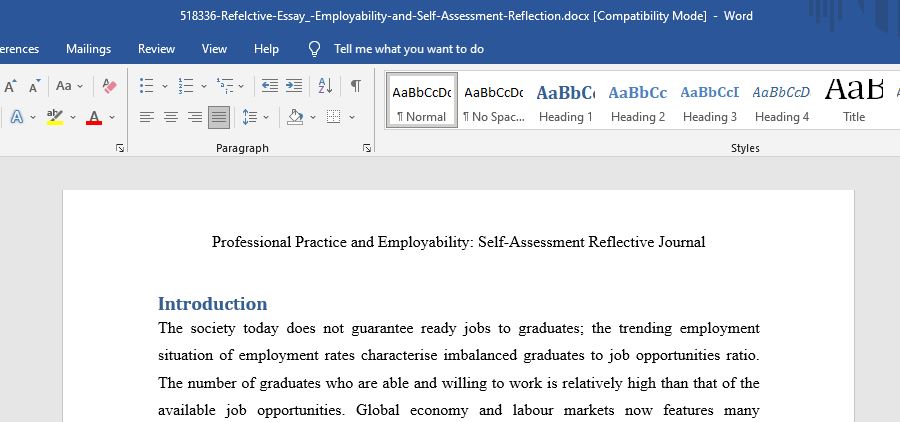PROFESSIONAL PRACTICE AND EMPLOYABILITY: SELF-ASSESSMENT REFLECTIVE JOURNAL
Assignment extract:
- Order Summary
- Type of assignment:Coursework
- Academic level:University Level, Bachelor’s
- Referencing style:Harvard
- Number of sources:15
- Subject:Business
- Client country:United Kingdom (UK English)
- Please see the attachment which is a document called (reflective journal requirements) which describe the Reflective Journal in detail. Please read the document carefully as it has the requirements for the course work. Also see the attachment called ( Harvard Referencing) to help with references.
- TaskComplete a reflective journal, to illustrate the process through which you have developed your employability skills. You must also include appropriate evidence to demonstrate your development and engagement in the graduate recruitment processes.
Your journal must contain sufficient entries to enable your development to be assessed and should include the following areas:
- An analysis of employer expectations of graduate skills – with particular reference to the industry sector in which you intend to work.
- A critical analysis of your work related capability and an action plan to bridge any gaps between this and business expectations.
- Your understanding of the graduate recruitment process and evidence of your development in a range of recruitment activities.
- A selection of reflections to demonstrate your development and competency in a range of employability skills (written using the STAR framework).
Guidelines
- You are not restricted to activities within the module to evidence the development of your employability skills; drawing on a variety of experiences can show more rounded skills development. So in addition to reflecting on tutorial activities, you can draw on your experiences from for example:
- current or recent full/part-time employment
- voluntary or charity work
- sporting activities or hobbies
- extra curricula activities (such as being a course rep, SVR, member of clubs or societies, guest lectures)
- When appropriate, you should provide additional evidence to support your journal entries. For example, you could include activity sheets completed in tutorials – such as a SWOT of your employability skills and an action plan for their future development; a copy of an old and a revised CV; a copy of your online application form identifying areas for improvement; observer sheets from mock assessment centre activities, etc.
- You are advised to use the STAR framework to help structure your reflective competency entries:
- Situation – brief information to give context to your entry.
- Task – activity, who was involved, key stakeholders.
- Action – what did you do, your involvement and contribution?
- Reflection – what worked/didn’t work? Why/why not? What will you differently next time? Future plans for change/improvements?
- The journal should develop skills of reflective practice, which is often a key requirement for professional accreditation in many disciplines. While it may be necessary to give a short ‘descriptive account’ to set the scene (Situation and Task)– the important elements are your reflections on your performance and experiences, demonstrating your understanding of what and why things did or did not work well, and how you would modify or change your behaviour, approach, etc in the future (Action and Reflection).
- You can write this journal in the first person, but remember this is an academic piece of work and you need to write formally and back up your discussion with references.
- The word count should be 3,000 words, + or – 10%. Work exceeding the word count (after 3,300 words) will not be marked.
Answer preview:
Word: 2,800

